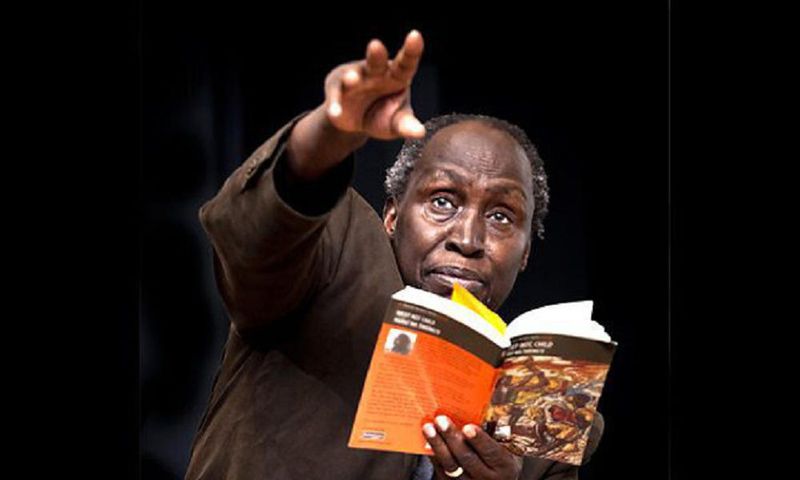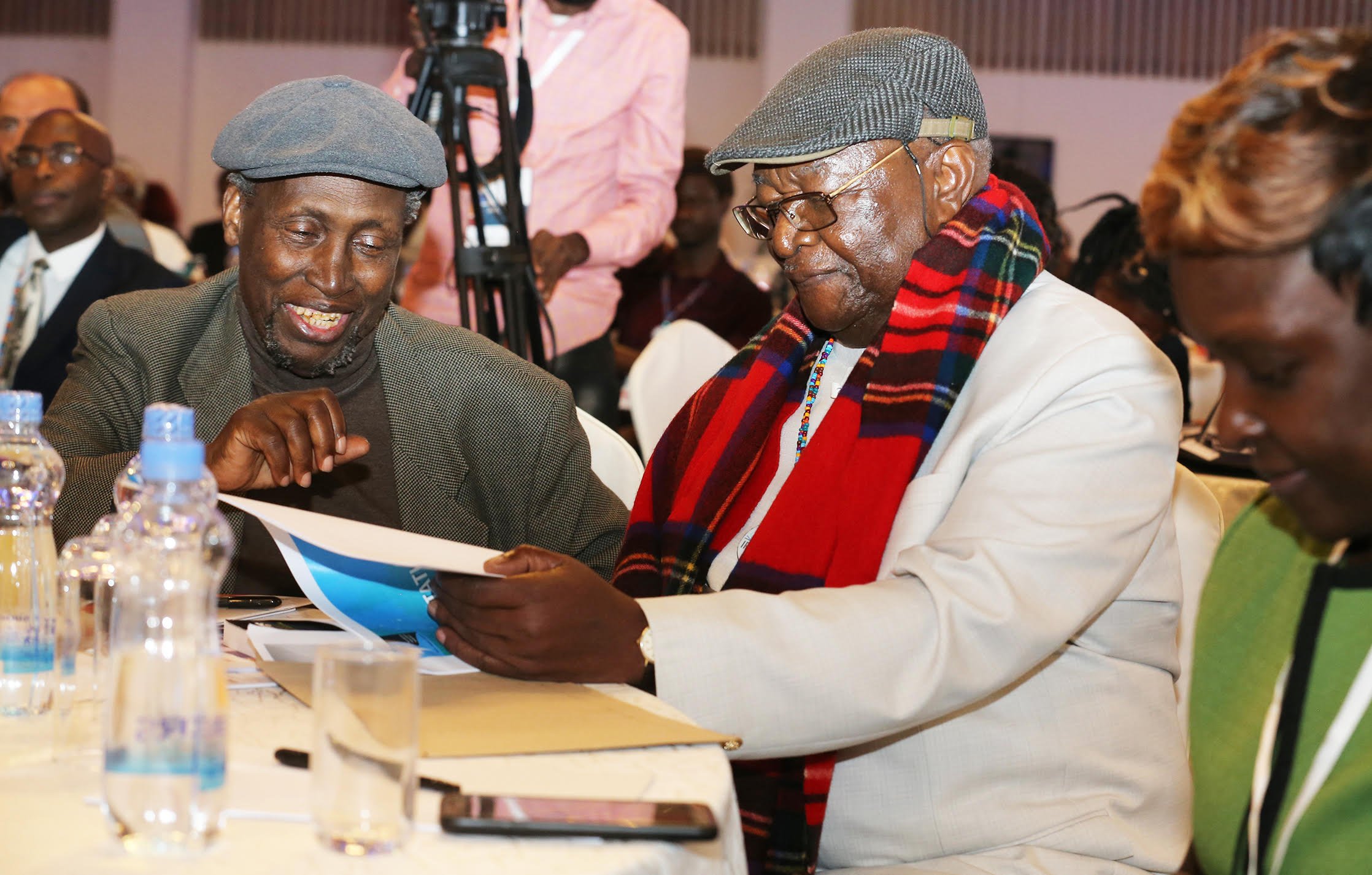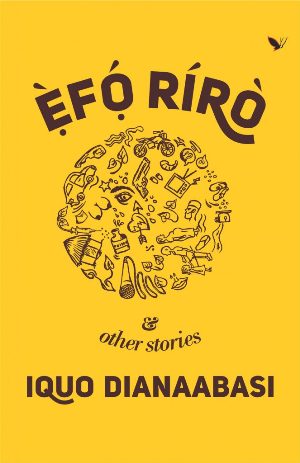IN MEMORIAM: HENRY CHAKAVA AND NGUGI WA THIONG’O
BLAZING AND DECOLONIZING AFRICA’S LITERARY TRAIL
In May 2019, I attended a 3-day seminar in Nairobi hosted by the International Publisher’s Association (IPA) and titled, Africa Rising . If you were to ask me what I took away from that event, I would say the wealth of insights and knowledge generously imparted by two patriarchs of the African book industry. The men were, Ngugi wa Thiong’o, world renowned author and scholar and decolonization activist, and Dr. Henry Chakava of East African Educational Publishers (EAEP).
It is true that the elderly men had difficulty standing for long periods of time but age had not extinguished the fire in their bellies. They were vigorous in their presentations on the stage, chronicling efforts they had dedicated their lives to making in order to see African languages restored to the centrality of African life.

Credit: via Google


Credit: via Google

Brian Wafawarova, a past President of the South Africa Publishers Association (PASA), has written touchingly about what the intergenerational mix of people who attended that seminar meant to him, how it enriched the Nairobi seminar. Even at the time, but especially now that they have left the world, for most of us convened at the Mӧvenpick Hotel, the presence of the two elders felt like a blessing. We experienced their presence like a prayer for Africa’s true rising.

Brian Wafawarova Nairobi Seminar Commentary
Peering through the dusty lens of the past - 6 years now - I can see Ngugi wa Thiong’o with a dreadlocked young man (his son?) suddenly appearing from nowhere to join him on stage. I remember finding it hilarious, the pair of them bursting into song, bellowing the chorus Glory Glory Hallelujah and its travesty, Gory Gory Hallelujah. I remember it suddenly clicking that the astonishingly loud noise they were able to make was a raucous music hall case for smashing a hierarchy of languages - one that prioritizes colonial languages while insulting our own.
Now, Ngugi’s calling out to a much younger bespectacled man. It’s Moses Kilolo of the Jalada Collective. He comes on stage and there, presents a miracle, a literary feat so wondrous, it has made world history.
Translated by the Jalada Collective, The Upright Revolution by Ngugi wa Thiong’o is the most translated short story in the world with what in 2019 were 54 translations out of 86 in African languages. Licensing rights for interpretations of these translations have been procured for drama, song, and visual art adaptations.
Standing on the shoulders of Ngugi wa Thiong’o and his publisher, Henry Chakava, the younger generation of Kenyans that evening demonstrated that they are more than capable of sustaining their nation’s rise as a cultural force.

Here, a brief introduction to the work being done by the successors of these two giants of African literature is necessary to understand the enormous power and influence of their legacy. Some of the many projects powering Kenya’s current cultural movement are:
- Bunk Books. A dynamic firm which partners with African writers and publishers to produce new and exciting African children's content, aiming to enrich literary experiences for young readers.
- Book Bunk. This imaginative and confident enterprise has partnered with Nairobi City County Government to restore, renovate, upgrade and decolonize 3 iconic public libraries in Nairobi: The McMillan Memorial Library, Eastlands Library and Kaloleni Library
- The Safal Kiswahili Prize for African Literature recognizes and rewards outstanding literary works in Swahili in diverse formats including memoir, poetry and graphic novels. The prize promotes Swahili’s status as an international language and champions literature published in Africa.

- The Kistrech International Poetry Festival aims to bring local and international poets together on one platform every year. With spoken-word, rap, song, poetry, oral poetry and mashairi (Swahili poetry), as its main features, the festival promotes poetry, art and cultural exchanges between local and foreign artists
- eKitabu publishes and distributes digital books, focusing on African literature and stories, making them accessible to a global audience.
- Storymoja organizes literary festivals and events to promote storytelling, reading, and writing, celebrating African literature and cultural heritage
- Positively African Media creates content and curates events that celebrate African stories and heritage in multi-media formats – from audio stories, to theatre productions and film. Story Story, Story Come! is Positively African’s debut anthology of 12 beautifully re-imagined African folktales.

We must take our place as part of the network of lingua franca, declared Ngugi at the Africa Rising seminar in May 2019. The place of our own languages must be alongside, not instead of, colonial languages. Publishers in foreign languages must begin to support the visibility, rather than procure or establish the invisibility of African language publishing. He was, I believe, referring to the kind of African language publishing pioneered by Henry Chakava, his first – and courageous – publisher. Chakava was the publisher of Ngugi's anti-colonial literary revolt - namely "Ngaahika Ndeenda", his first book in Gikuyu. It was later translated as, "I Shall Marry When I Want".

As an exponent of the power of African mother tongues to expand and enrich global culture, The Upright Revolution – an historic, multi-media, revolution in translation and licensing - is peerless.
That Nairobi evening, with his voice still powerful, Ngugi wa Thiong’o spoke beauty into the souls of the intergenerational crowd gathered for dinner in the hotel’s Great Hall. The essence of that beauty was his rejection of the notion that Africa can rise on English (read colonial) wings.
May the souls of Ngugi wa Thiong’o and Henry Chakava rest in eternal peace.
Ngugi wa Thiong’o – 5th January 1938 – 28th May 2025
Henry Chakava – 26th April 1946 – 8th March 2024





